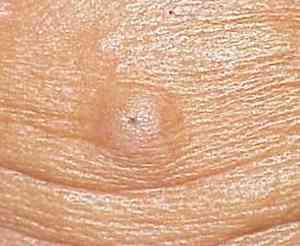

MedFriendly®


Benign
Benign is a term is used to describe medical conditions
or diseases that are considered mild or not likely to
spread. Even though benign conditions are not an
immediate threat, treatment may be necessary for
cosmetic or health reasons. An example would be
removing a benign cyst because of an unsightly
appearance or because it was compressing a part of
the body and limiting its function as a result. A cyst is
an abnormal lump, swelling, or sac that contains fluid, a
part solid material, or a gas, and is covered with a
membrane. A membrane is a thin layer of flexible tissue
that covers something.
A benign cyst of the skin.
FEATURED BOOK: Tumor Immunology and Immunotherapy
The opposite of benign is malignant. The terms "benign" and "malignant" are often used to
describe tumors. Tumors are abnormal masses of tissue that form when cells in a certain
area of the body reproduce at an increased rate. Unlike malignant tumors, benign tumors
stay in a localized area of the body. Malignant tumors are cancerous whereas benign
tumors are not. Cancer is an abnormal growth of new tissue characterized by
uncontrolled growth of abnormally structured cells that have a more primitive form. "kind."
When describing cancer, malignant means that the newly formed tissues are made of
abnormally structured and primitive-looking cells that grow uncontrollably, spread
throughout the body, and invade surrounding tissues. When samples of tumors taken from
a biopsy (tissue sample) are examined under the microscope, malignant tumors have
many characteristics that help clearly tell them apart from benign tumors. Benign comes
from the Latin word "benignus" meaning.
"Where Medical Information is Easy to Understand"™















